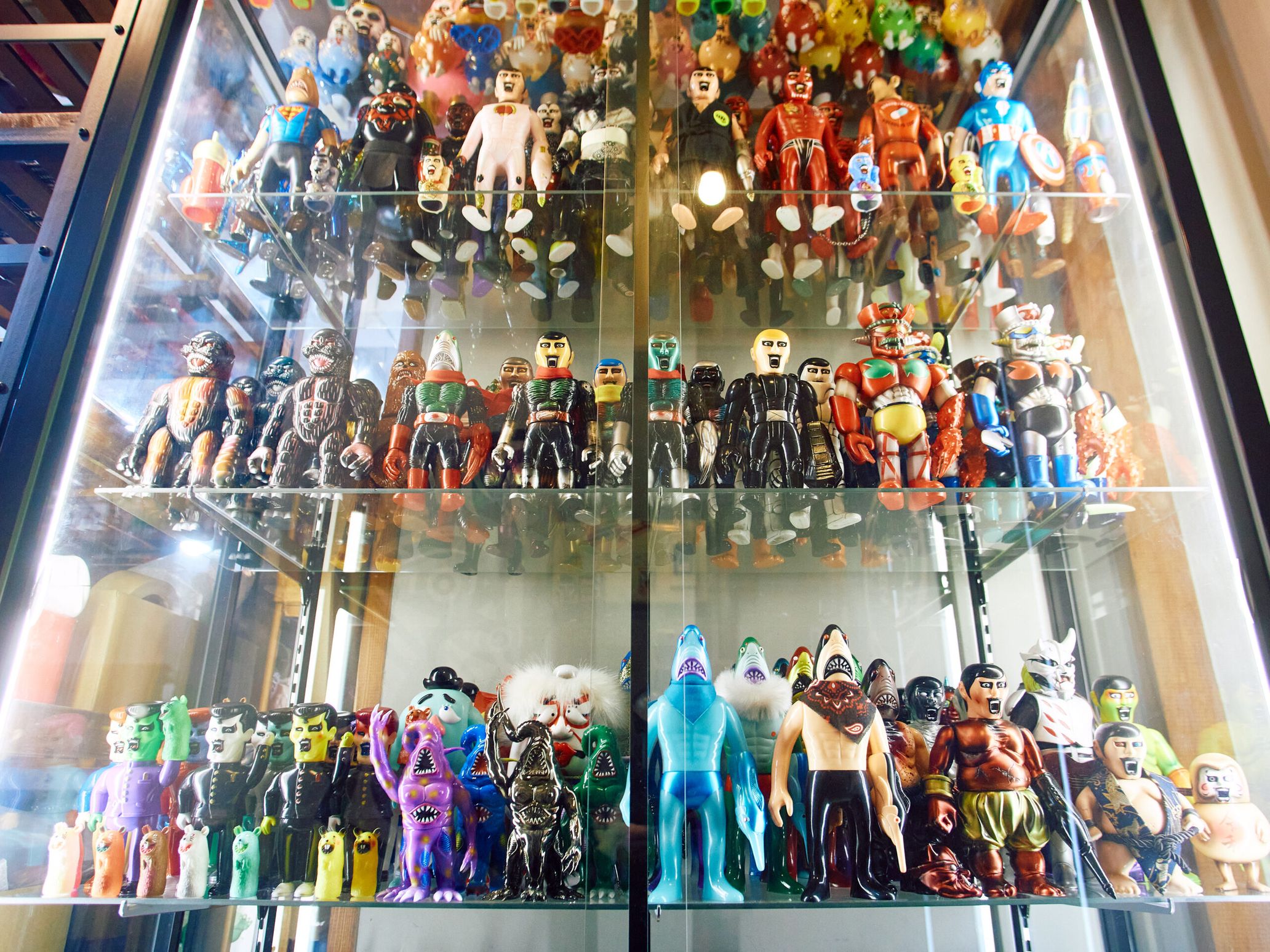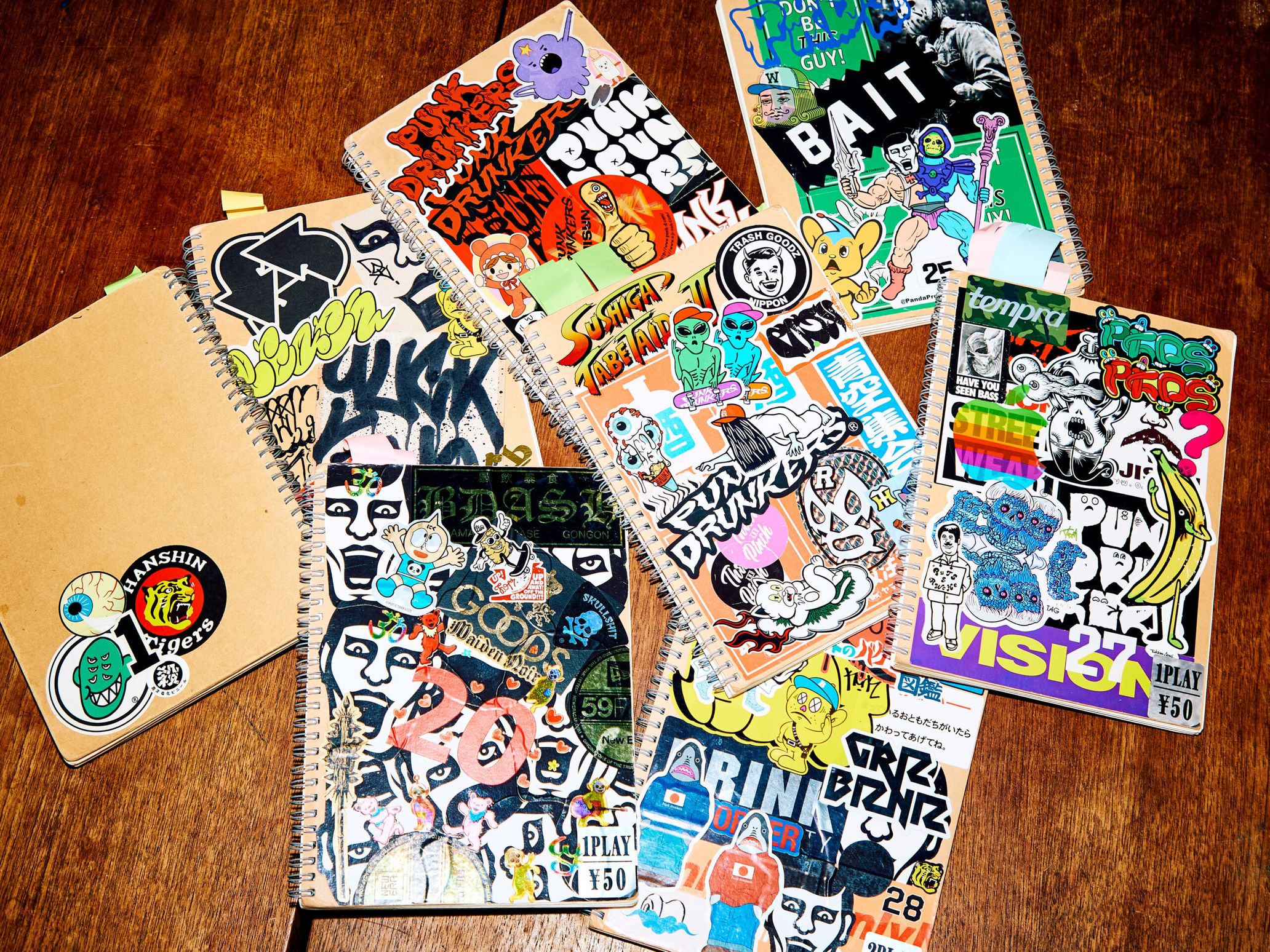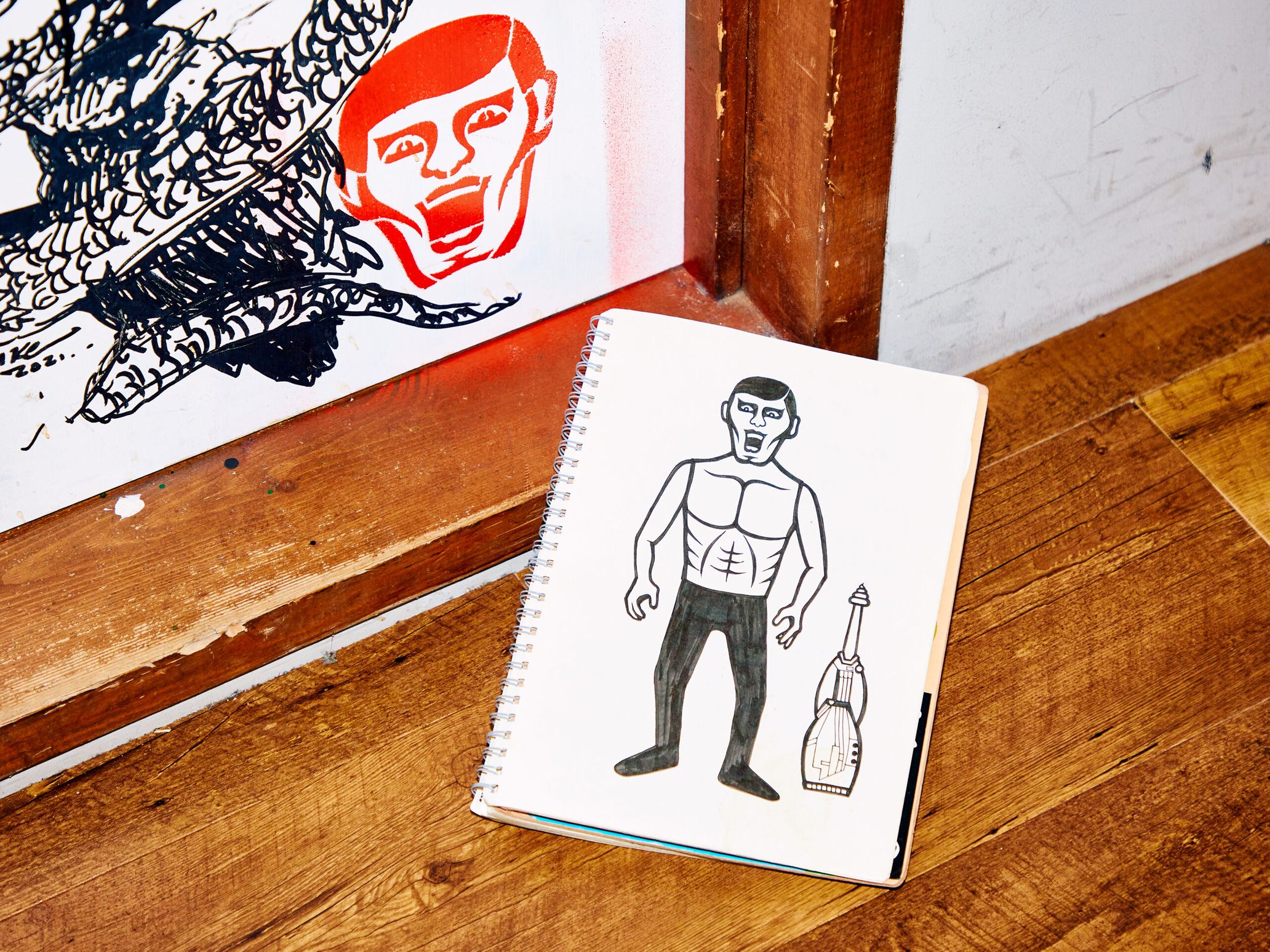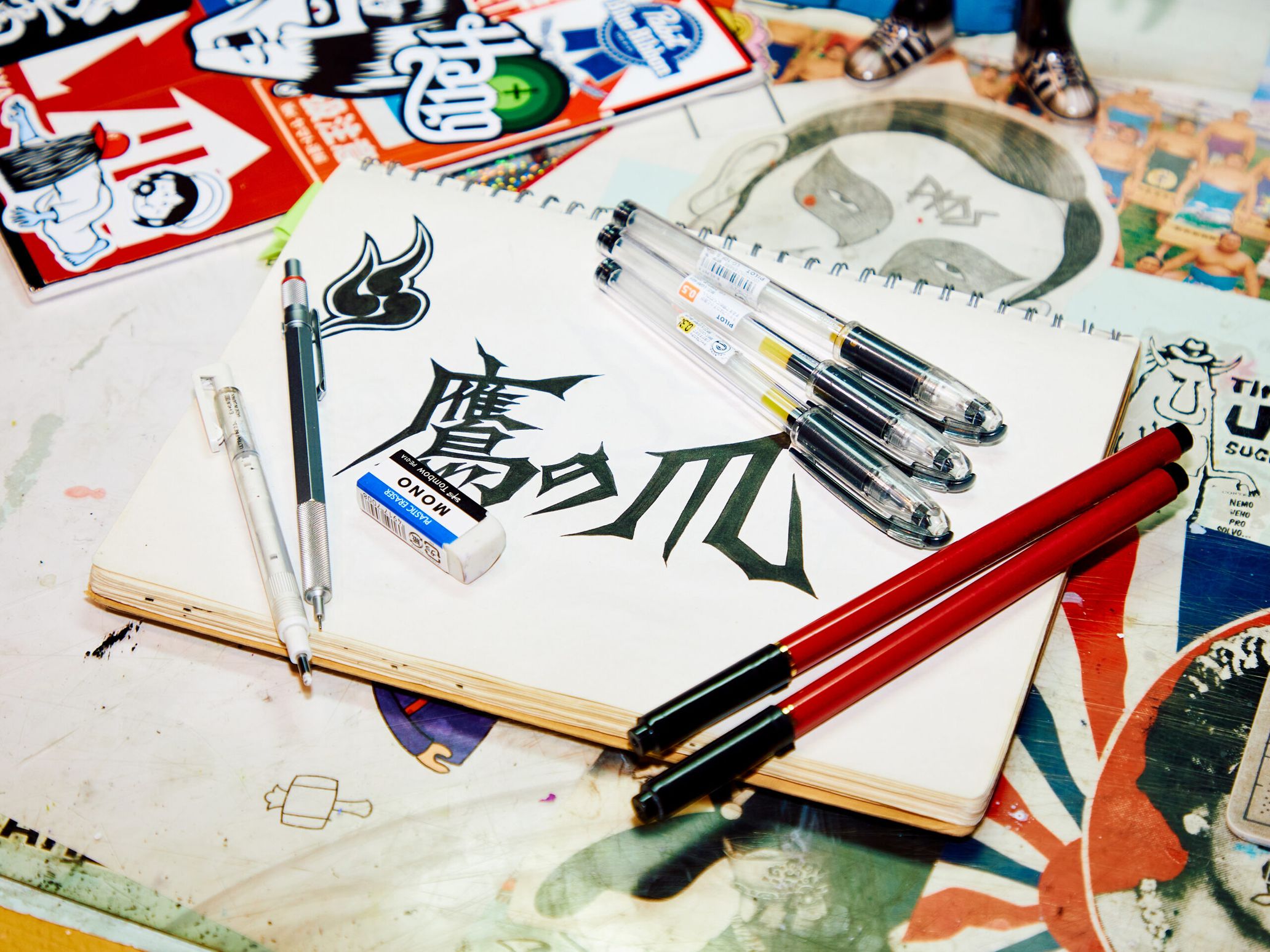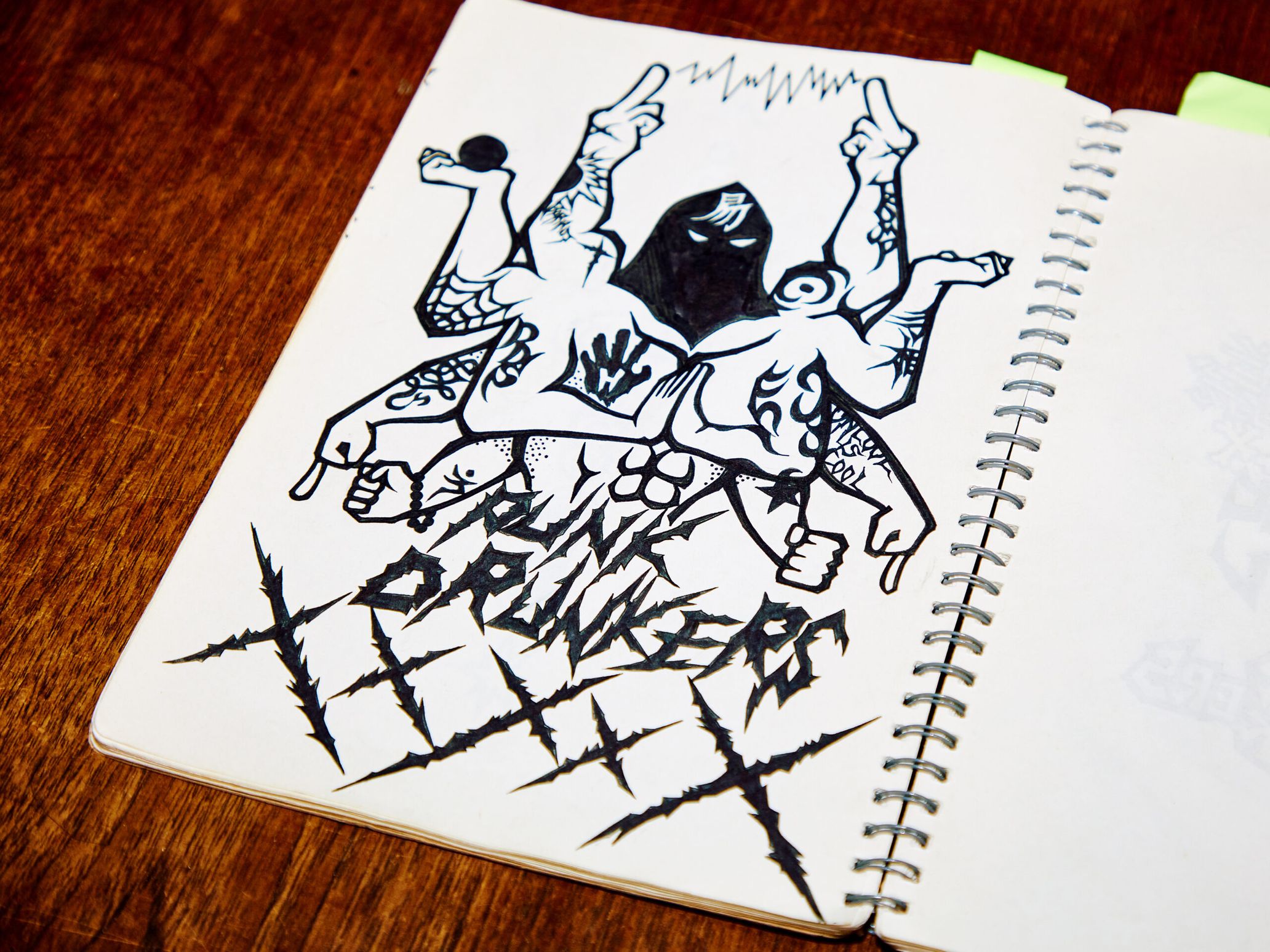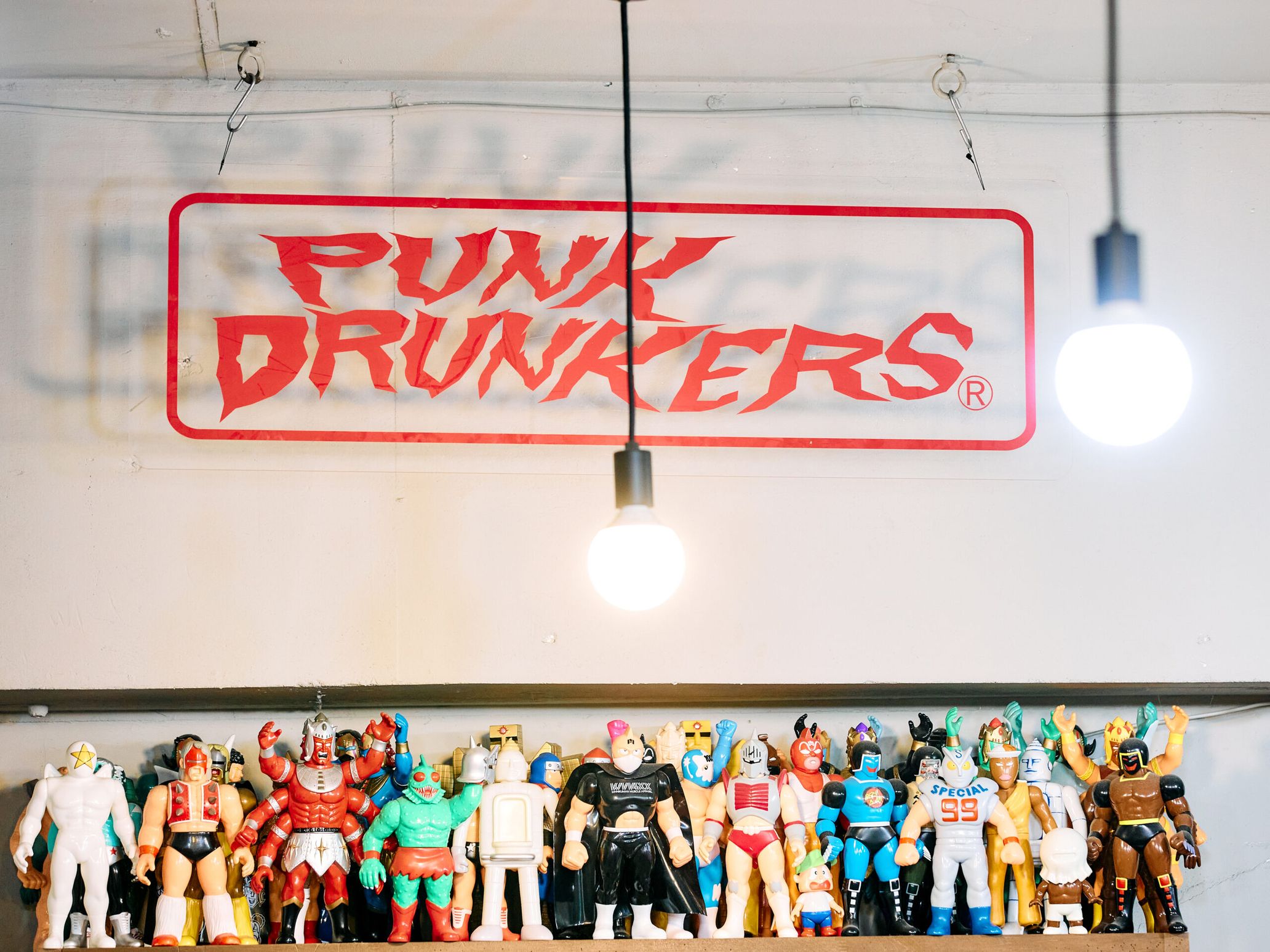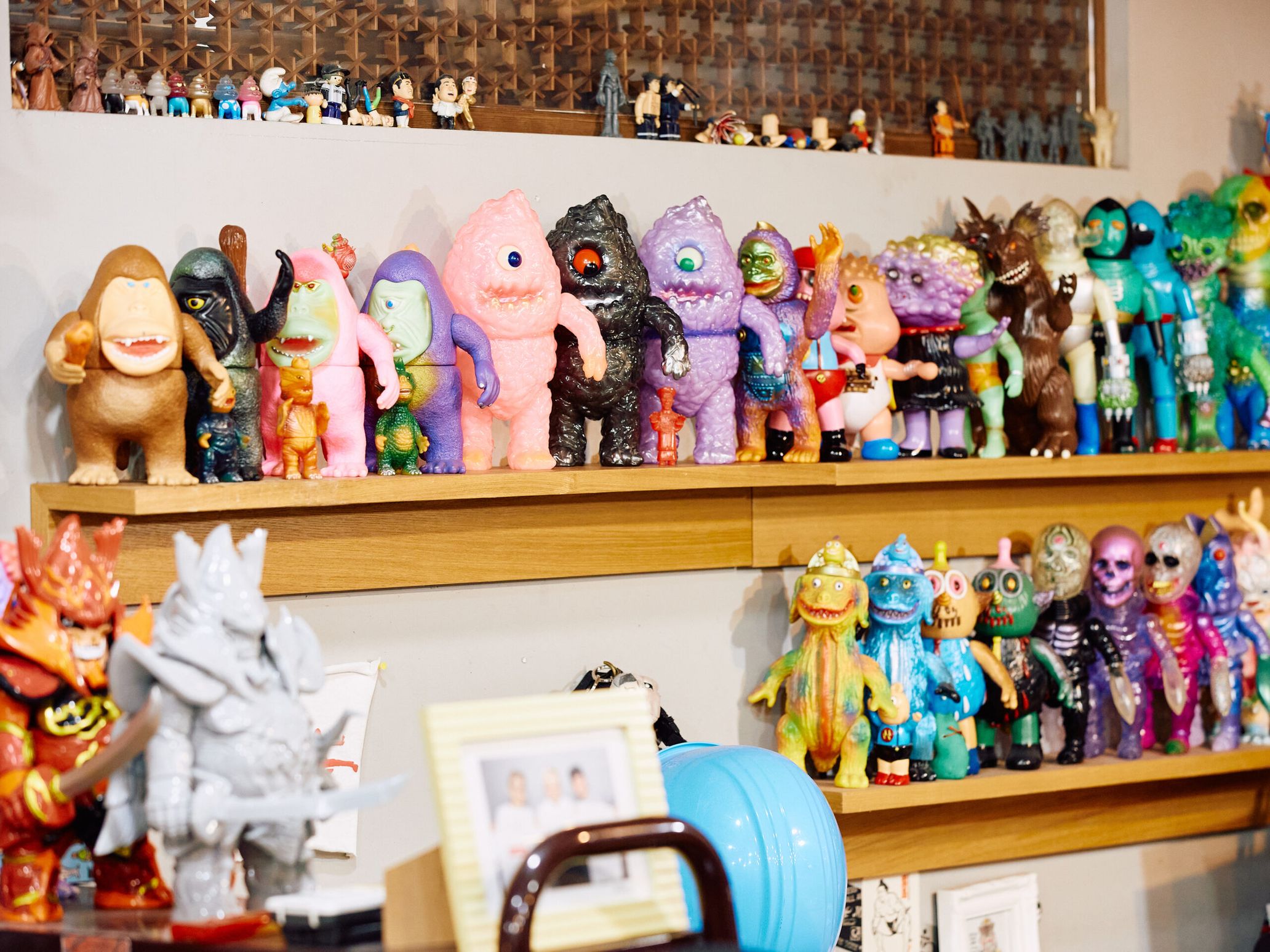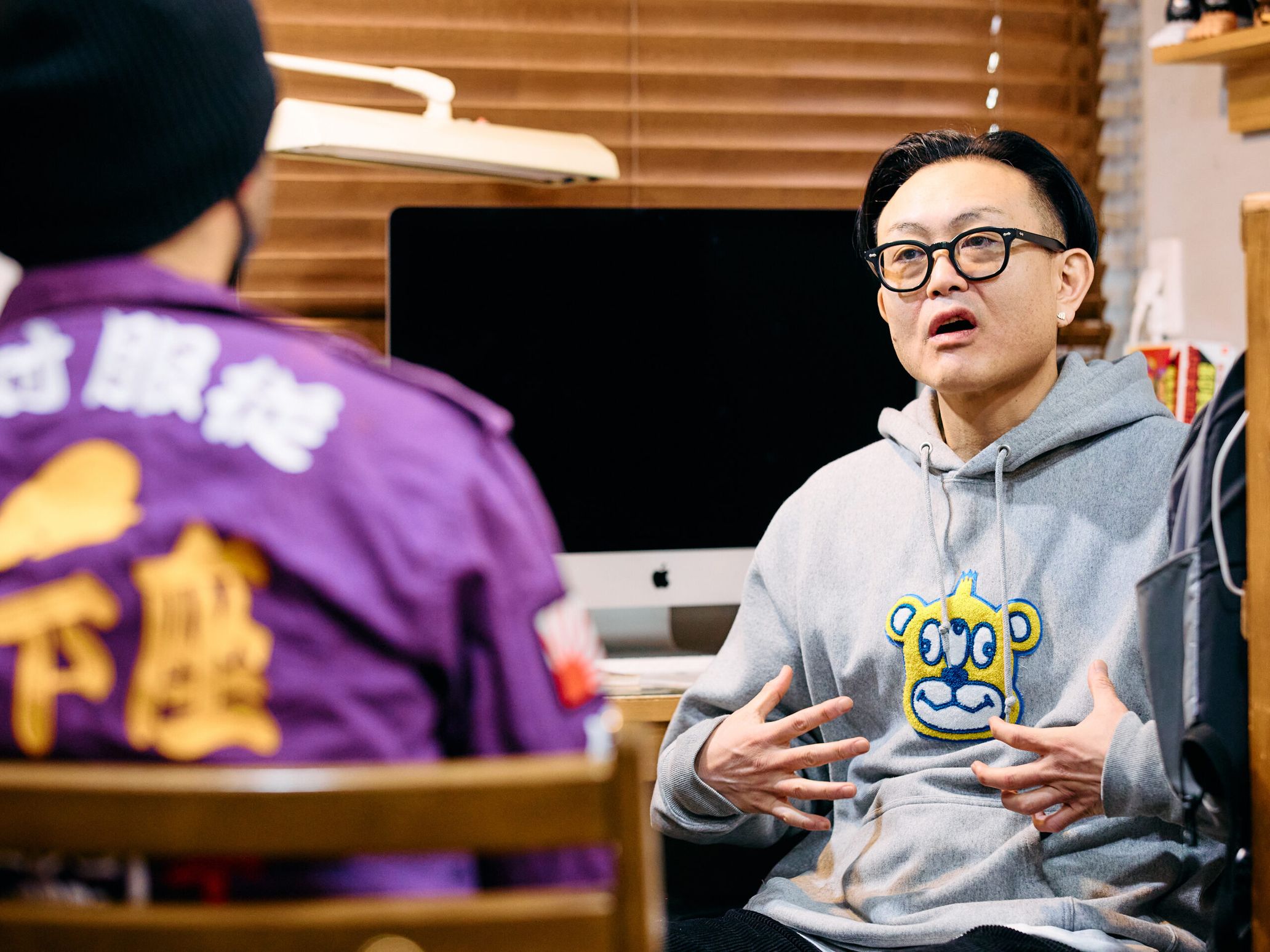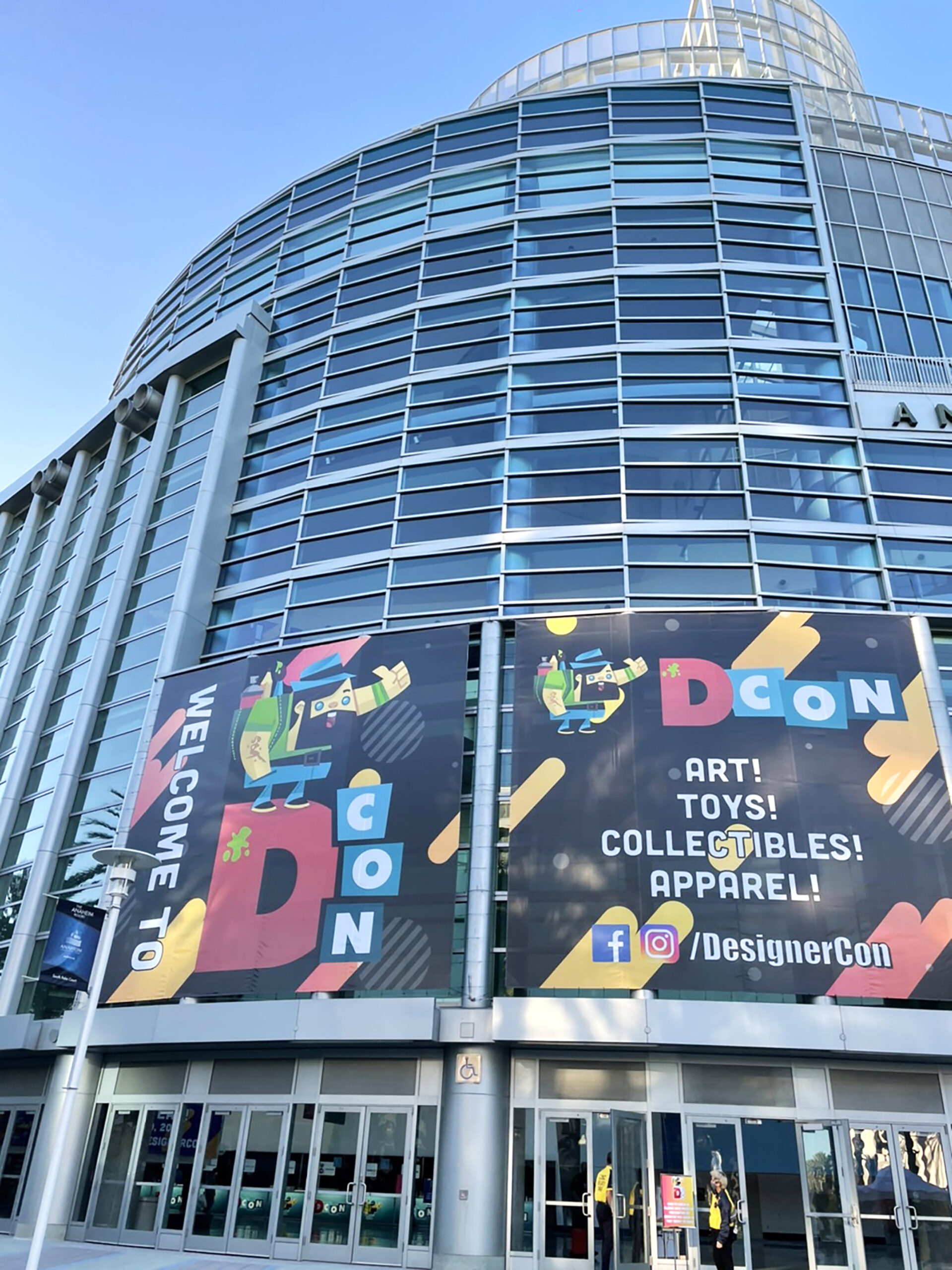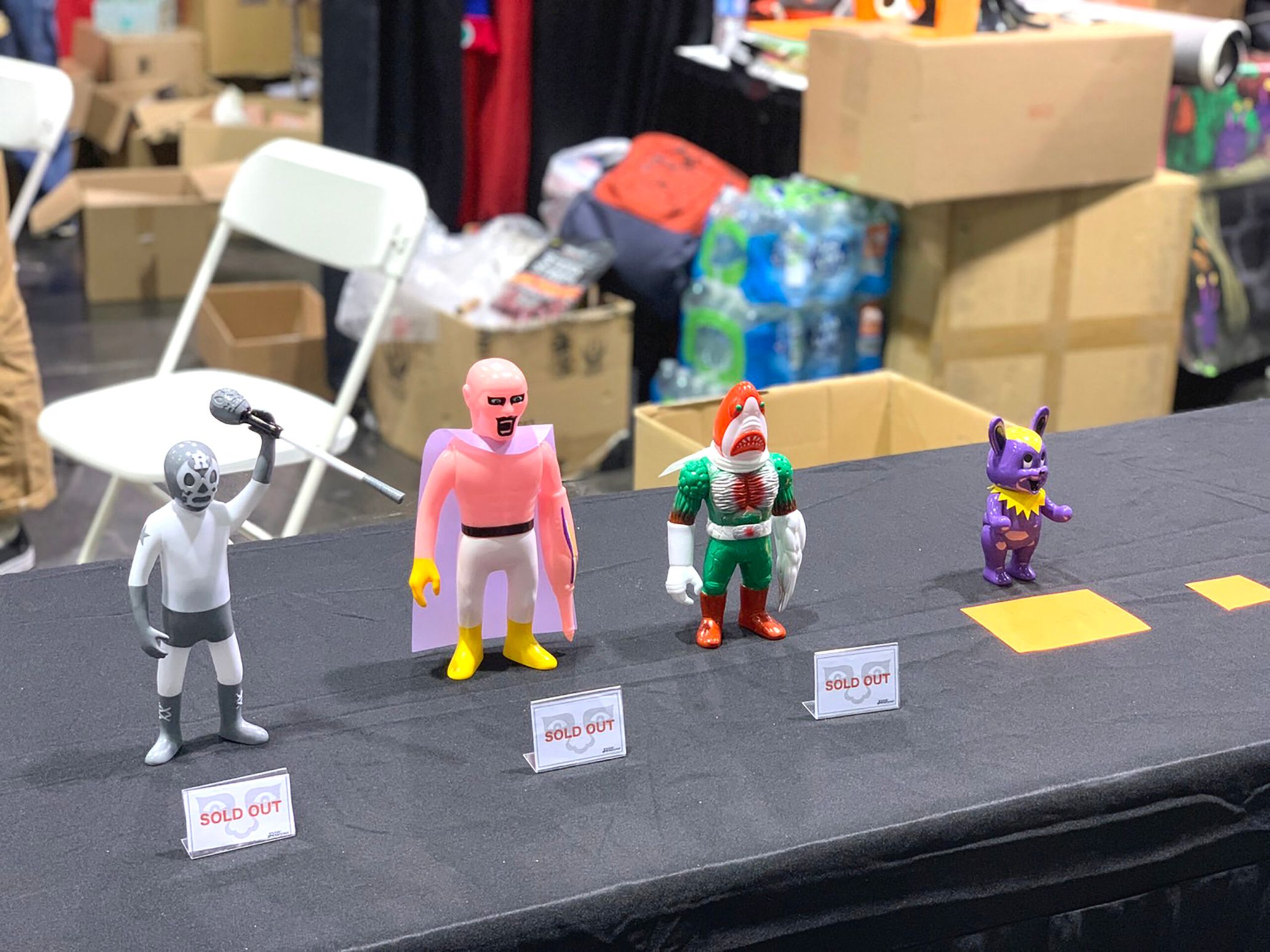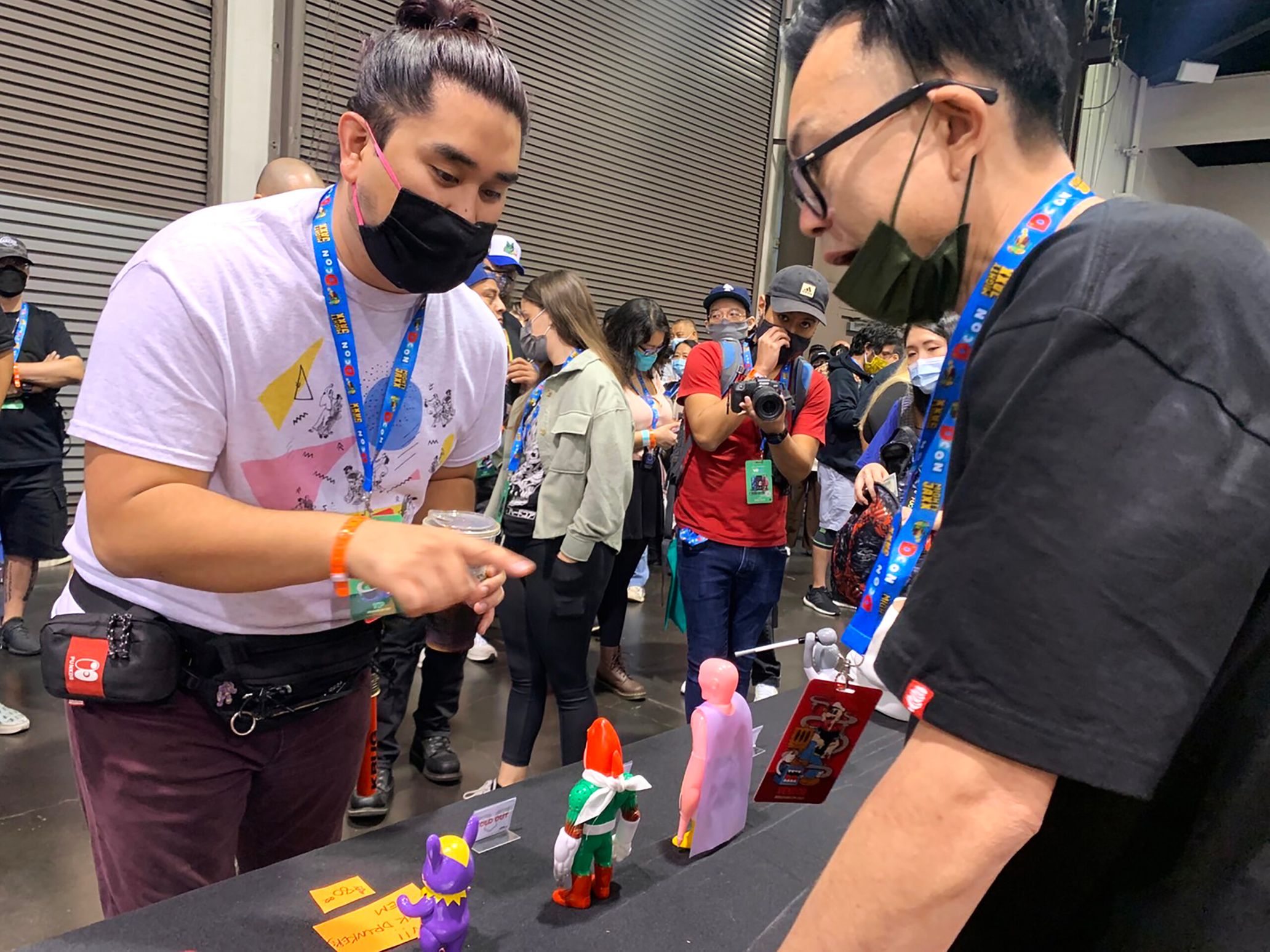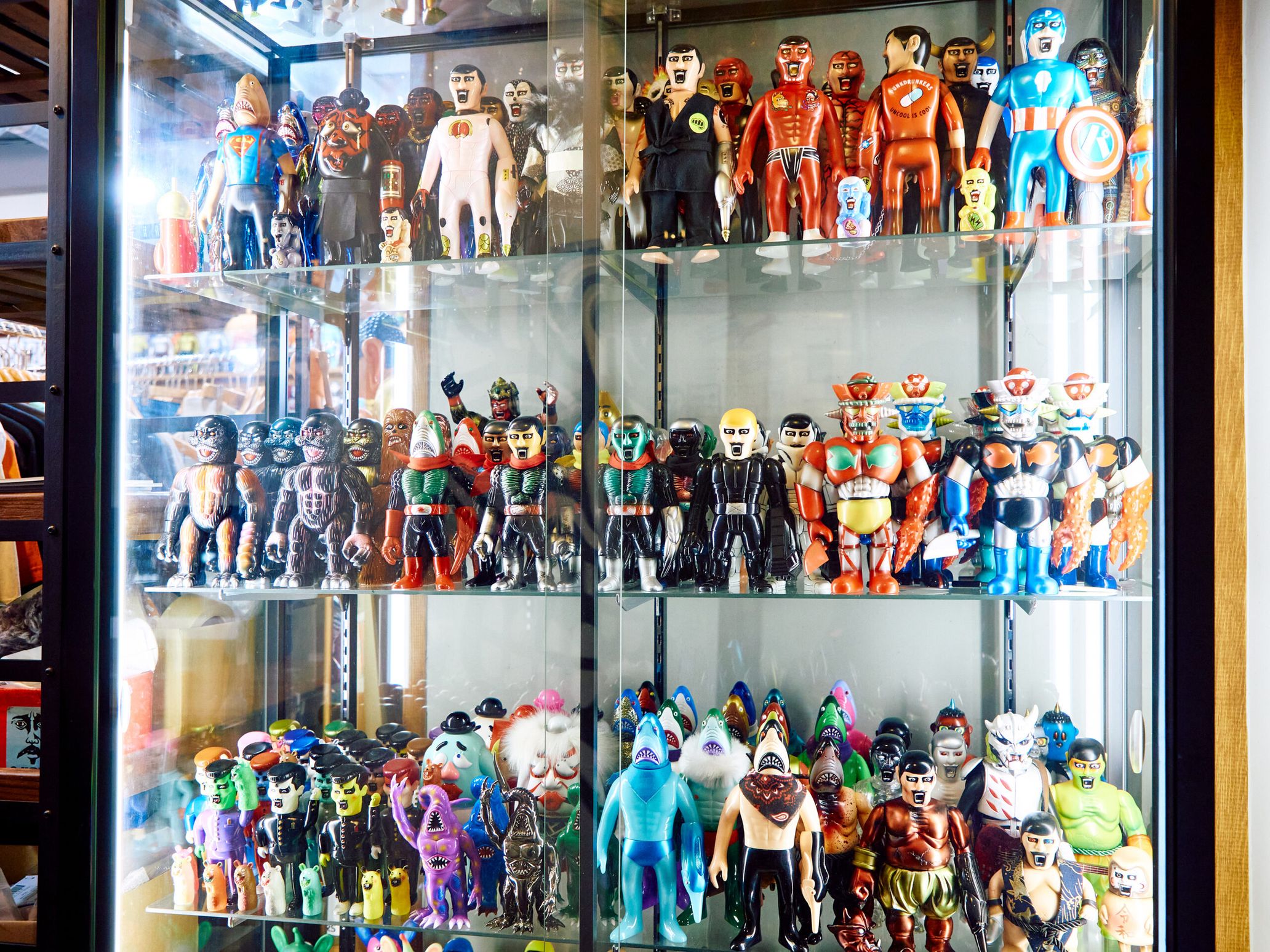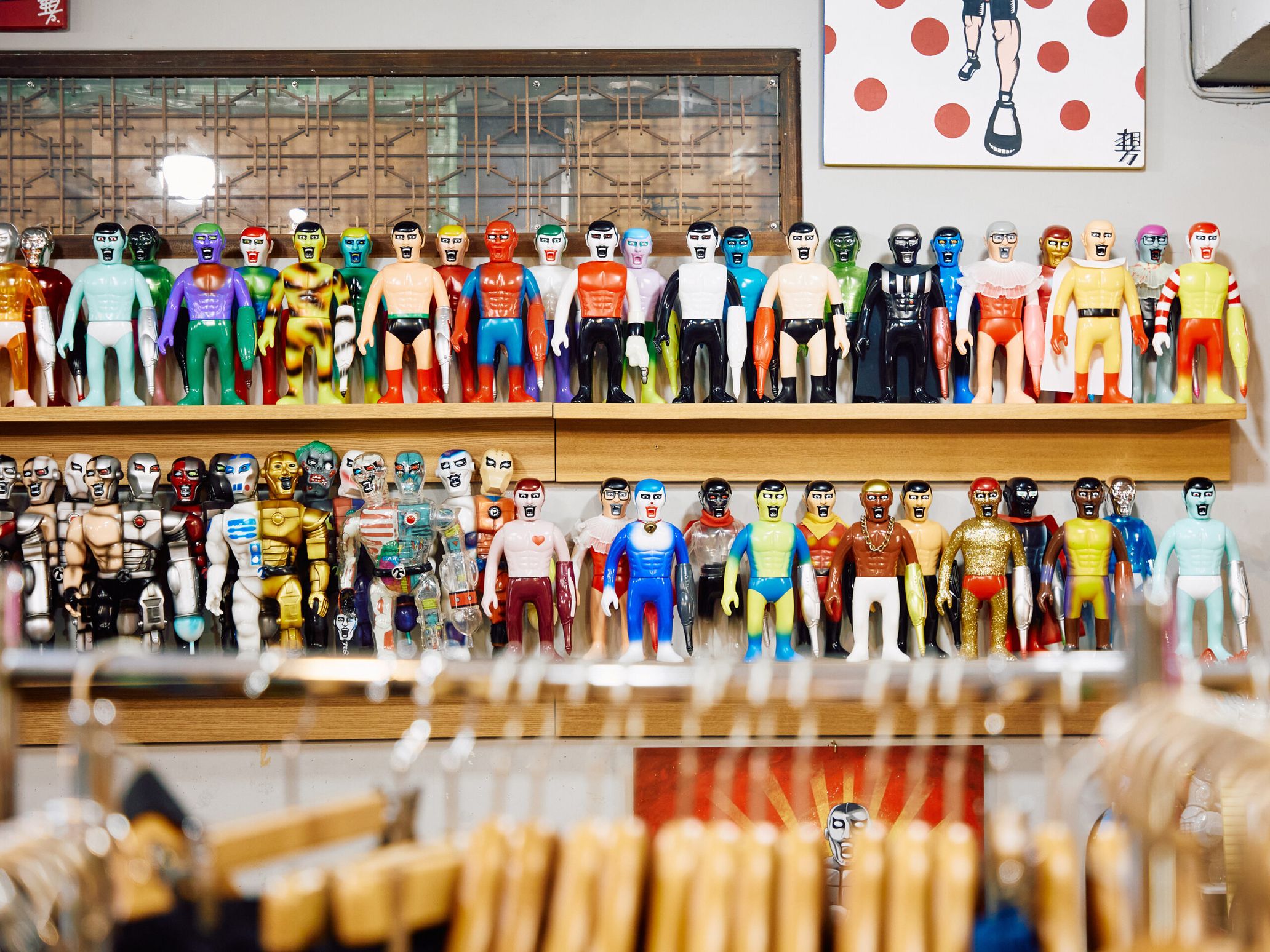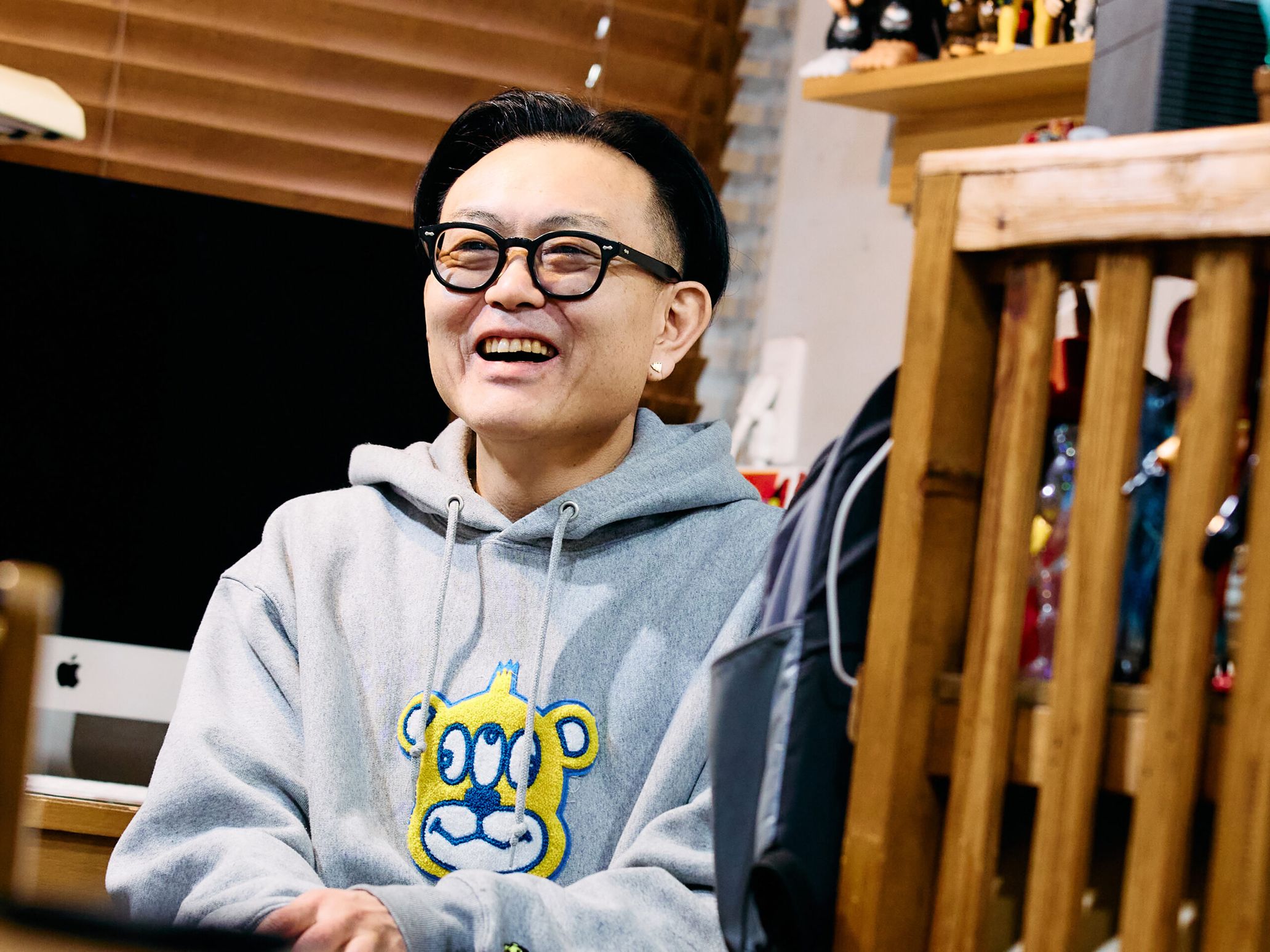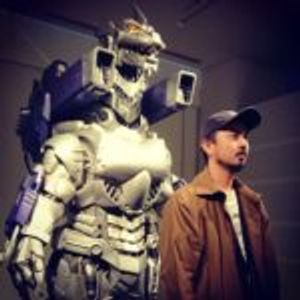Punk Drunkers is a fashion brand with the concept, “uncool is cool.” Designer and illustrator Oyakata is behind it all. His soft vinyl figures are loved worldwide, and Oyakata’s become a crowd-pleaser at DesignerCon. Is his tongue-in-cheek and kitsch universe an antithesis to modern society, stiffened with norms? We explore what makes Oyakata special, including his kitsch perspective and the international reaction toward Japanese culture.
Making people do a double-take is punk and authentic
——This might be out of the blue, but could you talk about how Aitsu, the legendary icon of Punk Drunkers, came to be?
Oyakata: I have a notebook filled with my drawings, and I remember that I drew him in that notebook around four years after starting the brand. At first, it was a graphic T-shirt, but it didn’t sell that much. I didn’t name the character. Once I started using the character two or three times, I became attached to him. When I was like, “I need to think of a name for aitsu (that guy),” I was like, “Aitsu sounds good” . I went with Aitsu because it’s easy to remember and sounds cool.
I often get asked about motifs, but I didn’t really create any. But as I began drawing characters with the desire to create a character like Spock from Star Trek, koitsu (this guy)—I mean—Aitsu was complete. They look different if you compare them, though.
——What makes Punk Drunkers distinctive is your sensibility, where the line between seriousness and fun is paper-thin. How do you come up with such unique ideas?
Oyakata: I never stop thinking, “Wouldn’t it be cool if so-and-so clothes and designs existed?” every day. When I walk down the street, I look at billboards and seeds of ideas.
The promotional video for Punk Drunkers
——Unlike drawing at your own pace as an illustrator, you have to meet deadlines every season as the designer of your brand. Does that pressure weigh on you?
Oyakata: I struggle with that every season. Even when I sit in front of my desk and say, “Alright, time to get to work,” I can’t produce anything. I start to rot away. It makes me be like, “I’m sick of this,” and sulk in bed. But once this goes on for a couple of days, [the spark] suddenly comes to me.
——You’re the analog type when it comes to drawing, right?
Oyakata: Very analog. I scan my hand-drawn drawings and color them on my computer. I think it’s cool when other people draw quickly on their tablets, but my friends stop me from doing the same. They tell me, “Your work will change, so you shouldn’t do it.” I also think it’s not good for me to be able to fix errors. I can focus when I draw because I can’t afford to screw it up. You know how sometimes you make a mistake but end up liking it after all? That sort of happy accident is interesting too.
——Which artist has influenced you the most?
Oyakata: I’ve been influenced by so many different people, but I’ve always liked the senseis behind Kinnikuman. I also love Taro Okamoto-san so much. And Pushead and USUGROW too. USUGROW drew the cover art for a hardcore band called Nunchaku, and I liked that a lot because of how cool it is.
——It sounds like you like illustration styles that incorporate thick outlines.
Oyakata: Yeah, I do. It’s true! The lines in my drawings are thick too.
——What do you keep in mind when you create?
Oyakata: To not end up normal. I don’t like it when people tell me, “That’s normal.” Something eccentric that makes people look twice is punk and true to who I am.
——It’s interesting how the audience could understand your work straightforwardly the moment they see it.
Oyakata: That might be intentional. I’ve always intended to make easy-to-understand things, even if [the audience] and I don’t speak the same language. Maybe that’s why I get a good reaction from people abroad.
——You’re well-known abroad as a soft vinyl (sofubi) figure artist. When did you start becoming interested in that?
Oyakata: As a kid, I had sofubi toys of monsters from Ultraman, but I became interested in them around a decade ago when two sofubi manufacturers called Zollman and fivestartoy approached me for a collaboration at the same time. From that point onwards, I got obsessed. I was like, “I didn’t know this world existed.”
——Your sofubi toys sell out immediately, and they’re sold abroad at different events.
Oyakata: I started joining events abroad around seven years ago. The first event I joined was DesignerCon in Los Angeles, and the sofubi I brought didn’t sell out. I had a few left. I did business with a dealer there, and they bought the sofubi toys. I came back to Japan after that, and by the following year, I had great success with huge lines! Within that year, I joined different Asian events and put my name out there more and more. I got a good response.
Being antsy and unable to sit still
——Are there many international artists with a similar style as yours?
Oyakata: Some people make both clothes and toys. My friends that run a store called Violence Toy in San Diego are an example of that. They bought the license for Gremlins and RoboCop to design these stylish sweaters. I also think they’re similar to us because they run the store only with a few people. I joined San Diego Comic-Con International for the first time recently.
——It’s a well-known convention that includes all genres of pop culture and entertainment like comics, toys, and anime.
Oyakata: The biggest one in America is San Diego Comic-Con International. Then it’s New York Comic Con and DesignerCon, I think. I got an offer from ComplexCon, but I had another event I had to attend, so I turned it down. Plus, real indie artists are at DesignerCon, so you can geek out and have fun there!
——Do you speak English, by the way?
Oyakata: Not at all. I say whatever I can. I sometimes have an interpreter/liaison with me, but people use easy English words when speaking to me, so I don’t really feel inconvenienced. I studied it for a while because I wanted to speak it, but I couldn’t. Also, whenever I stay abroad for a long time, I can generally pick up and understand what people are saying by the end of my stay.
——How’s it like getting the reaction you get overseas?
Oyakata: Once I went abroad, I understood how sofubi is part of Japanese culture. People think somewhat highly of me simply because I’m an artist “from Japan.” It’s like, “Oh yeah, this is what I’ve been waiting for!” . In the toy industry, I feel very respected.
——You’re respected not as the Oyakata of Punk Drunkers but as the Oyakata of sofubi. Is that different in Japan?
Oyakata: I wonder. In Japan, only a few people make a living only on sofubi. Most people work as sofubi artists alongside other jobs. It’s said that young people don’t work at sofubi factories because the workload is backbreaking. There are only a couple [factories] around downtown. With that being said, it seems like the number of young people working [in the industry] is slowly increasing because they’re starting to realize it’s an option.
——Things change with time. I’m sure many people change along with the times, especially now. What about you?
Oyakata: I haven’t changed. I’ve liked the things I like today since middle school. I’m a middle schooler by heart. I’m not good at advertising and promoting, so I don’t understand how that’s changed. I sometimes think it’s unfortunate how huge lines form at international events, but I can’t reach people in Japan the same way. I feel frustrated during those moments.
——Those in the know understand how brilliant your work is. What do you think the fans want from you?
Oyakata: I talk to sofubi fans at events. Most of them are middle-aged men. It’s an unfruitful thing, a middle-aged man signing something for another middle-aged man. They’re all so pure. When they say, “Please never stop making sofubi!” I listen to them while thinking, “It would be amazing if a cute woman said this to me” .
——Don’t you have a lot of people anticipating something new from you since you just recently made stuffed toys?
Oyakata: I want to keep doing new things as long as I have the opportunity. Minicars, for example. Supreme and Hot Wheels collaborated before, and I’m so jealous of that. I still have so much I want to do. I have quite a few fans abroad, so I want to collaborate more there. I hope to continue doing the work I’ve been doing and widen my horizons a bit.
At this year’s DesignerCon in November, the organizers told me, “We’ll get a big booth for you and cover the expenses. We want you to make collab clothes too, aside from sofubi.” I assume that will be the biggest job for us this year.
——Even during covid, your proactive spirit hasn’t wavered.
Oyakata: I can’t stand sitting still because I’m so antsy. I’m planning on going here and there while doing something fun.
※Continues to the last half part
Oyakata
Born in 1971 in Chiba. Has a 3rd dan in karate, left-handed. In 1998, Oyakata established his brand, Punk Drunkers, based on the concept, “Japanese + Western + Fun” and “uncool is cool.” He designs a variety of things outside of clothes. Oyakata has frequently held solo exhibitions and live painting sessions since 2003.
Instagram: @oyakatapunk
http://www.punk-d.com
Photography Yuji Sato
Translation Lena Grace Suda
Edit Shuichi Aizawa(TOKION)

